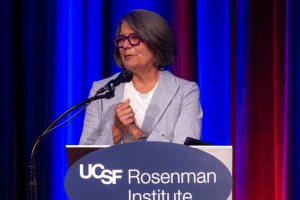Dr. Sandra Hernández Receives 2025 UCSF Healthcare Impact Award
UCSF Rosenman Institute honors a pioneering leader whose life’s work has reshaped healthcare in California
“Sandra has never stopped advocating for the people our system too often overlooks,” said Christine Winoto, Executive Director of the UCSF Rosenman Institute. “She’s built a legacy of compassion, public accountability, and purpose-driven leadership that exemplifies what this award stands for.”
In a fireside chat with Sam Glick, Chair-Elect of the Rosenman Institute and Executive Vice President at Kaiser Permanente, Dr. Hernández reflected on her path from working in community clinics to leading one of the state’s most influential health foundations. Their conversation emphasized upstream investment, building public trust, and designing systems that serve the people who depend on them most.
A former Director of Public Health for San Francisco and longtime advocate for Medicaid reform and equity in care delivery, Dr. Hernández served in clinical practice at San Francisco General Hospital from 1984 to 2016. Since 2014, she has led CHCF, advancing programs that invest in community-based care and reimagine California’s healthcare infrastructure with equity at the center.
The UCSF Healthcare Impact Award is presented annually at the Rosenman Symposium to recognize exceptional contributions in healthcare that reflect UCSF’s mission to advance health worldwide. In 2024, the inaugural award was presented to New York Times columnist Nicholas Kristof in recognition of his reporting on global health disparities and underserved communities.
“We’re honored to recognize Sandra not just for what she’s done, but for how she’s done it,” said Winoto. “She leads with empathy, courage, and a relentless drive to do what’s right.”
About the UCSF Rosenman Institute
The UCSF Rosenman Institute is a healthcare innovation hub at the University of California, San Francisco. We convene the brightest minds in healthcare, connect them across disciplines, and catalyze solutions that transform care. We accelerate the development of groundbreaking health technologies by providing entrepreneurs with access to mentorship, funding, and business development opportunities. Through programs such as ADAPT, RISE, and Rosenman Innovators, the Institute is committed to advancing healthcare equity, improving patient outcomes, and transforming care on a national scale.
Herminio Neto
UCSF Rosenman Institute
+1 415-307-5904
email us here
Visit us on social media:
LinkedIn
Legal Disclaimer:
EIN Presswire provides this news content "as is" without warranty of any kind. We do not accept any responsibility or liability for the accuracy, content, images, videos, licenses, completeness, legality, or reliability of the information contained in this article. If you have any complaints or copyright issues related to this article, kindly contact the author above.
Kenneth W. Welch Jr. Reveals Spiritual Entrepreneurship Secrets for Global Impact
New Study Establishes Supremacy of Complexity Science and Randomness in Machine Learning for Neurosymbolic Computation
ATA Ushers in a New Era of Intelligent API Management with AI at the Core
Więcej ważnych informacji
 Jedynka Newserii
Jedynka Newserii

 Jedynka Newserii
Jedynka Newserii

Polityka

Polska może się stać Doliną Krzemową Europy. Potrzeba jednak wsparcia finansowego start-upów i mocniejszej deregulacji
Polskie start-upy skoncentrowane są głównie na rozwoju nowoczesnych technologii informatycznych i cyfrowych. Wyraźny nacisk na oprogramowanie i aplikacje oraz big data i data science wskazuje na silne zainteresowanie narzędziami analitycznymi i rozwiązaniami wspierającymi transformację cyfrową w różnych branżach – wynika z raportu „Rynek start-upów w Polsce. Trendy technologiczne”, który został opracowany w 2024 roku w MRiT. Zdaniem europarlamentarzystów Polska ma szansę się stać Doliną Krzemową, jednak rozwój start-upów blokowany jest m.in. przez ograniczony dostęp do finansowania oraz niekorzystne i nadmierne regulacje.
Transport
Na półmetku wakacji ceny paliw na stacjach nie powinny się wyraźnie zmienić. Znaczące różnice między regionami i stacjami

W sierpniu ceny benzyny, oleju napędowego i autogazu powinny pozostać na poziomach z lipca – uważa ekspertka rynku z firmy Reflex. Wyższe będą zawsze na stacjach premium, tych, które oferują bogatszą ofertę dodatkową, promocje dla uczestników programu lojalnościowego, oraz w regionach, w których tradycyjnie paliwa są droższe ze względu np. na wyższą siłę nabywczą mieszkańców. Różnice mogą sięgać kilkudziesięciu groszy na litrze. Obszary, wokół których te wartości oscylują, zależą z kolei od sytuacji globalnej. Warto patrzeć na sytuację na Bliskim Wschodzie i w Ukrainie.
Polityka
A. Mularczyk (PiS): Nawiązanie poważnego dialogu z Niemcami jest konieczne nie tylko w kontekście reparacji. Powinien być podpisany traktat polsko-niemiecki

– Nie wystarczy jednorazowy gest czy inicjatywa. To musi być podjęcie dialogu, być może też przygotowanie nowej umowy bilateralnej, nowego traktatu polsko-niemieckiego, który regulowałby wszystkie obszary, które wynikały ze skutków II wojny światowej – mówi Arkadiusz Mularczyk, poseł do Parlamentu Europejskiego z PiS-u. Podkreśla, że proces ten nie będzie łatwy, bo wymaga konsekwencji i stanowczości, ale widzi szansę w prezydenturze Karola Nawrockiego, który już zadeklarował kontynuację starań w tym zakresie. Zdaniem europosła wsparciem w polsko-niemieckim dialogu może być administracja Donalda Trumpa.
Partner serwisu
Szkolenia

Akademia Newserii
Akademia Newserii to projekt, w ramach którego najlepsi polscy dziennikarze biznesowi, giełdowi oraz lifestylowi, a także szkoleniowcy z wieloletnim doświadczeniem dzielą się swoją wiedzą nt. pracy z mediami.




![Nestlé w Polsce podsumowuje wpływ na krajową gospodarkę. Firma wygenerowała 0,6 proc. polskiego PKB [DEPESZA]](https://www.newseria.pl/files/1097841585/fabryka-nesquik_1,w_85,r_png,_small.png)




.gif)

 |
| |
| |
|